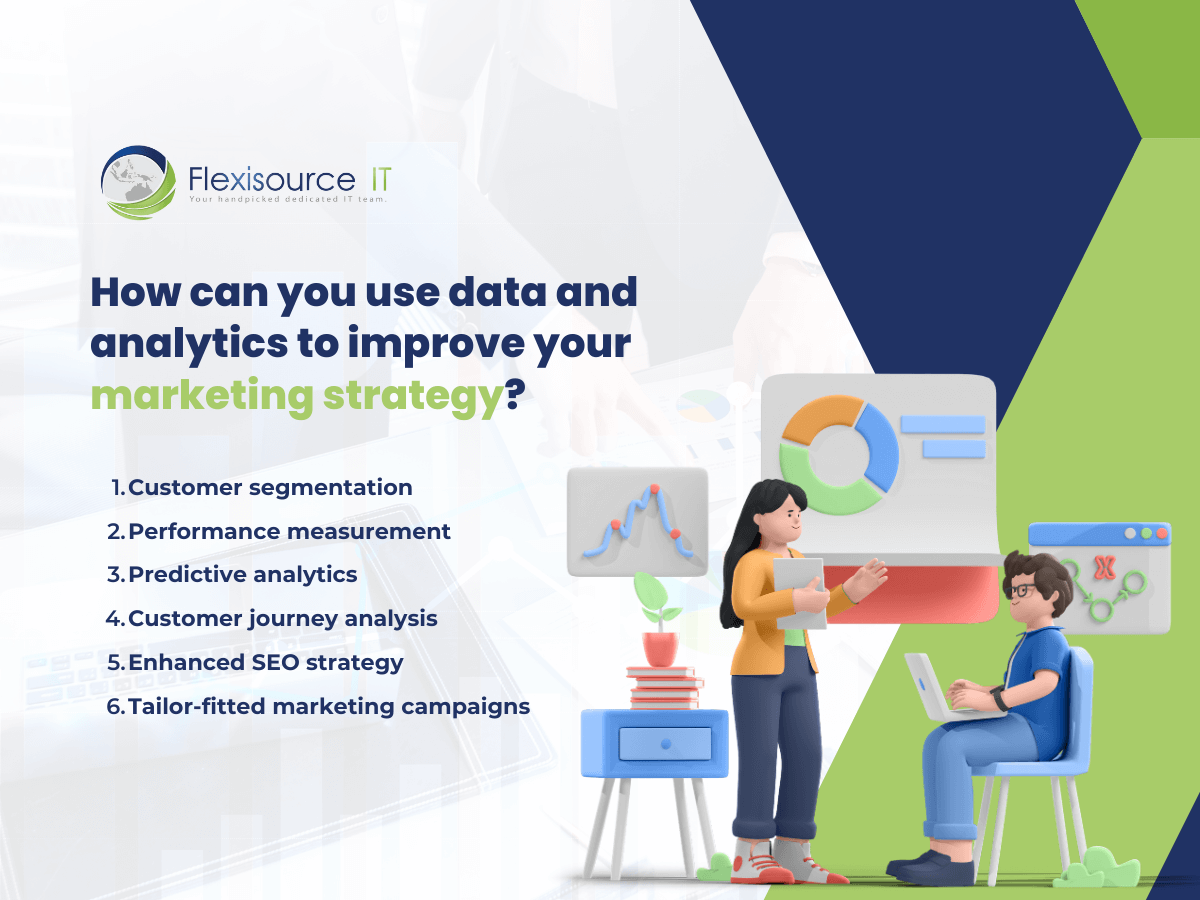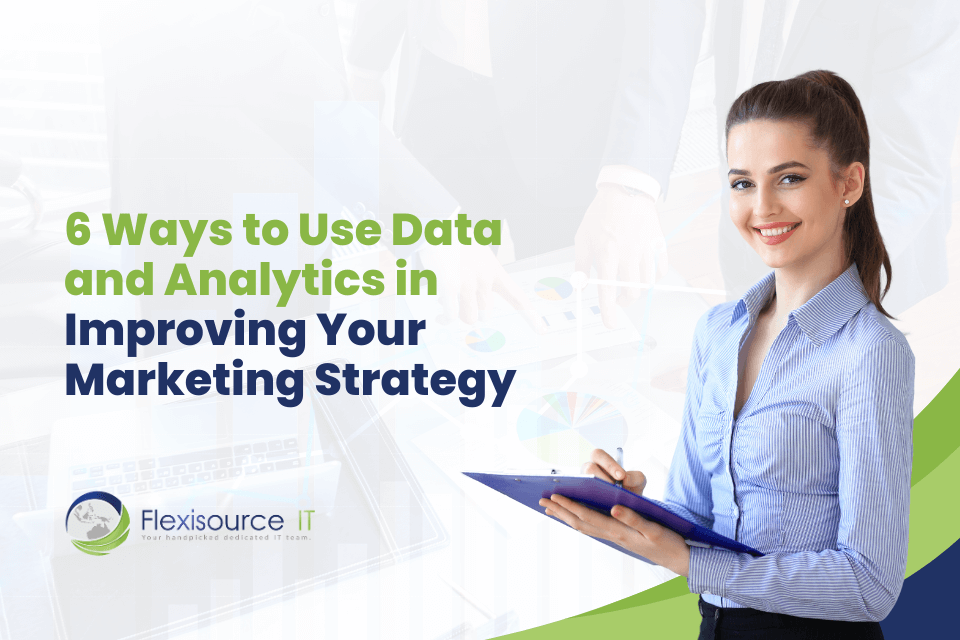Data and analytics have emerged as invaluable tools to revolutionise how businesses connect with their target audience in the ever-evolving marketing landscape. The abundance of information generated through various channels gives businesses an unprecedented opportunity to gain valuable insights into their target audience’s behaviours and preferences. Through data and analytics, companies can gain a profound understanding of consumers, enabling them to shape more targeted and effective marketing strategies.
As such, we will tackle practical and effective ways to utilise data and analytics to improve your marketing strategy in this article. From uncovering hidden consumer trends to optimising campaign performance, these strategies will empower you to make data-driven decisions that resonate with your audience and drive tangible results.
What is data and analytics?
Data and analytics are two of the most powerful tools in the modern world. Data is a collection of information that can be used to make decisions and gain insights. At the same time, analytics is analysing data to uncover patterns, trends, and relationships.
These two provide businesses an invaluable resource for understanding their customers, markets, operations, and more. With this knowledge, companies can make informed decisions that will help them stay competitive in today’s ever-changing environment.
Why are data and analytics important to marketing?
Data and analytics are essential components of successful marketing. Marketers can gain valuable insights about customer behaviour, trends, and effectiveness of campaigns through these elements.
Likewise, data and analytics in marketing are essential for the following reasons:
- Make informed decision-making. As mentioned, data and analytics provide valuable insights into consumers’ preferences. Marketers can make informed decisions about their marketing plan’s target audience, strategies, and product positioning through these data. This helps them optimise their marketing campaigns, enabling them to allocate all resources effectively.
- Personalise campaigns. Data gives marketers the power to personalise their strategies and segment their audiences. Marketers can tailor their messaging, content, and offers to individual customers by analysing customer data, such as demographics, browsing patterns, and preferences. This can help enhance retention and customer loyalty.
- Customer Understanding. Data and analytics allow marketers to understand their target audience better. Likewise, you can tailor their marketing messages, products, and services to meet customer needs and expectations better.
- ROI Optimisation. Both enables marketers to assess their marketing activities’ return on investment (ROI). By tracking the performance of campaigns and attributing sales or conversions to specific marketing efforts, marketers can allocate their resources more effectively, optimising their marketing budget and ensuring maximum ROI.
How can you use data and analytics to improve your marketing strategy?
Using data and analytics is crucial for enhancing your marketing strategy. Here are several ways in which you can leverage to improve your marketing efforts:

Customer Segmentation
Data and analytics are becoming increasingly crucial for businesses to understand their customers better. You can divide your customers into distinct segments by analysing data about your customers, such as demographics, behaviours, and preferences. As such, companies can segment their customers into different categories based on their preferences, behaviours, and other factors.
This helps them create more targeted campaigns tailored to specific customer segments and increase engagement with those customers. Likewise, it allows companies to tailor their marketing messages and campaigns to particular groups, resulting in more targeted and effective communication.
Performance Measurement
You can use data and analytics to measure your marketing campaign’s performance accurately. Through these KPIs, such as conversion rates, click-through rates, and customer acquisition costs, you can assess the effectiveness of your strategies and make data-driven decisions to optimise your marketing efforts.
Likewise, you can also use analytics to track employee productivity and engagement levels, allowing them to assess the success of their team members. This data-driven approach helps organisations make better decisions about managing resources and allocating funds for maximum returns.
Predictive Analytics
You can employ predictive analytics to anticipate future trends and behaviours by analysing historical data. This helps you identify potential opportunities and challenges, enabling you to adjust your marketing strategy proactively. Predictive analytics also aids in forecasting demand, optimising inventory management, and making informed decisions regarding resource allocation.
Similarly, data and analytics also help you gain insights into your competitors’ marketing strategies and performance. By monitoring their activities, social media presence, and customer sentiment, you can identify gaps in the market, benchmark your undertaking, and develop strategies to differentiate yourself from the competition.
Customer Journey Analysis
Data and analytics in customer experience play a significant role in marketing. With this, businesses understand their customers to provide personalised experiences and increase customer loyalty.
Similarly, both can provide a comprehensive view of the customer journey. By mapping out the various touchpoints and interactions customers have with your brand, you can identify pain points, areas of improvement, and opportunities for enhancing the overall customer experience. This knowledge lets you strategically adjust your marketing efforts and create a seamless customer journey.
Enhance SEO Strategy
We all know that SEO is a data-driven marketing strategy. It requires marketers to understand algorithms used by search engines to rank websites and how users interact with search engines. Through these data, marketers can make informed decisions with their SEO and increase visibility on the internet.
As such, data and analytics can help you enhance your SEO strategy. By leveraging information and data from tools such as Google Analytics, you can gain valuable insights, including the best content to maximise customer engagement and keywords that drive the most traffic.
Tailor fitted Marketing Campaigns
Data and analytics allow you to monitor and refine your marketing campaigns continuously. By tracking real-time data, you can identify which marketing channels, messages, or creative elements are performing well and which are underperforming. This insight lets you make data-backed adjustments to optimise your campaigns, allocate resources effectively, and improve your return on investment (ROI).
Conclusion
In summary, data and analytics are crucial in any business to increase revenue and stay ahead of the competition. Integrating these elements into your marketing strategy allows you to make informed decisions, improve targeting and personalisation, optimise campaigns, and enhance the overall customer experience.
So, whether you are a business owner or a marketer, you must always know how to utilise it properly. And if you need further help, try consulting an expert. Let Flexisource IT handle your data and improve your marketing plan. Contact us now!









